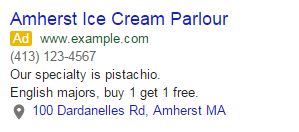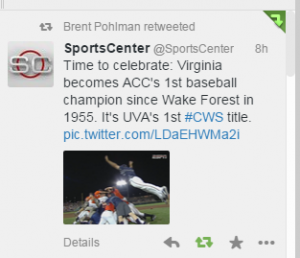Google defines Ad Extensions as “a type of ad format to show extra information (“extending” from your text ads) about your business.” You may find ad extensions effective since you’re giving searchers more reasons to click on your ad. These ad extensions can improve visibility by taking up more real estate on the search results page. Additionally, because you’re giving more information to searchers, they help improve click-through-rates (CTR) and bring down price-per-click (PPC) costs.
There are multiple types of ad extensions that can be used to show different information. In order for ad extensions to appear, you must show up in the top 3 positions of the search results page. There are no additional fees for using ad extensions. They’re treated the same as receiving a click on your regular ad. Below we break down each type of extension.
Click to Call Extensions
These extensions give searchers a call button link to directly call your business. These are good to use if your business requires or allows for calls to your location. For example, if you have a pizza delivery restaurant, this extension could prompt people to call and place an order.

Location Extensions
Location extensions are great for local businesses who want people to come into their brick and mortar stores. Two studies commissioned by Google last year confirmed that “local searchers are ready to act. Many visit a nearby location within a day and complete purchases at a higher rate than consumers who conduct non-local searches.” For example, florists, cleaners, or boutiques can show up for people in certain geographic locations. These extensions show the address and phone number and link to Google Maps for easy directions. If searchers can see your location without having to look it up separately it may sway their decision to come into your store.

Review Extensions
If your retail location has won awards, such as having a Zagat rating or Best Of category, you can display this on your search ad. Additionally, you can pull in reviews from customers as well. This symbol of excellence may be the deciding factor between a potential customer choosing between your restaurant and another one for lunch.

Sitelink Extensions
Sitelink extensions allow you to add links to additional pages and content on your website. This gives you the ability to share the information you think your potential customers may be interested in. If you have a retail store, you can highlight sales, promotions, or popular items. Additionally, you can use it to showcase your blog or a store locator.

Callout Extensions
Similar to sitelink extensions, callout extensions offer a way to highlight additional information. The difference is that callout extensions don’t link to any specific page on your site. The ideal way to use these is to “call out” things that may influence a buyer. For example, “free shipping”, “money back guarantee”, etc. can be good uses for these call outs.

Social Extensions
The social extension shows searchers how many followers you have on Google +. Probably the least important of all the extension types, but having a high follower number does signify trust which can bode well for your business. If you’ve taken the time to build your social following it’s worth including since your ad is taking up more real estate on the search results page.

Whether you’re a local business or an online retailer, competition can be fierce. Leveraging ad extensions can help you get the leg up on your competitors by making information more accessible to potential customers. Ideally, you should make use of every extension you to influence searchers decisions. Check out Google’s support page to learn about additional extensions, implementation and more.
(247)
Report Post






